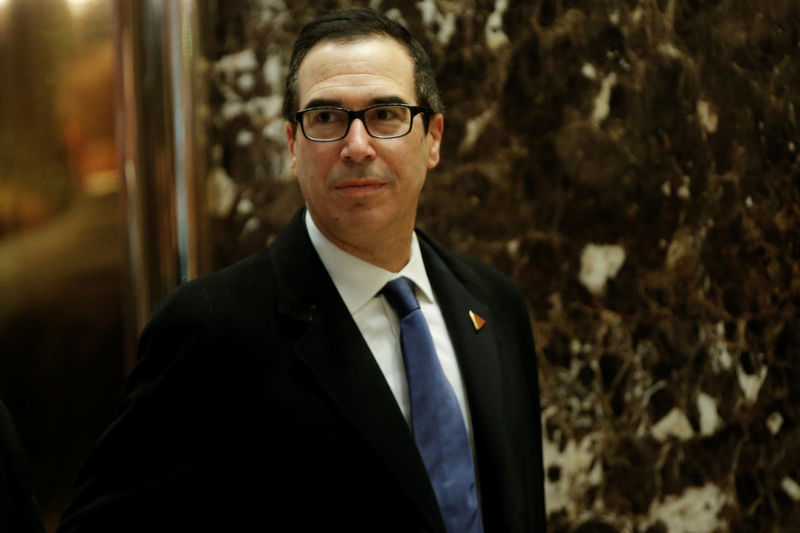(Adds comments, Trump officials' complaints about China, Germany, context)
By David Lawder
WASHINGTON, March 13 (Reuters) - U.S. Treasury Secretary Steven Mnuchin will be "pushing hard" to advance U.S. interests in his debut meeting with Group of 20 counterparts this week, including reaffirming commitments to avoid competitive currency devaluations, a senior Treasury official said on Monday.
Mnuchin, who will attend a meeting of finance ministers and central bank governors from the G20 major economies on Friday and Saturday in Baden-Baden, Germany, also will press countries to help strengthen global growth, the official told reporters.
"The G20 can play a helpful role in advancing U.S. interests. The secretary will be pushing hard to make that come to pass, whether it's on macroeconomic policies, exchange rate policies etcetera," the official said.
The official said it was important to the Trump administration that previous G20 commitments to not target exchange rates to gain a competitive trade advantage be reaffirmed and fully implemented.
But that explicit pledge, which has long been a part of past G20 communiques, was not included in an early draft of the statement to be issued at the Baden-Baden meeting. The early draft, which is subject to more revisions, simply stated "we reaffirm our previous exchange-rate commitments." early draft also dropped language to "resist all forms of protectionism" in favor of a pledge to "maintain an open and fair international trading system."
The U.S. Treasury official declined to discuss the language that would be in the final communique but said that the Trump administration was committed to "fair and open trade."
"I think that means a trading system that has a level playing field for our firms and our workers globally, and we'll be encouraging policies that lead to that level playing field so that our firms and workers are not disadvantaged," the official said.
Trump officials have criticized China on a host of trade-related fronts related to its $347 billion trade surplus with the United States last year.
These include President Donald Trump's own charges that Beijing manipulates its yuan currency and Commerce Secretary Wilbur Ross' complaints about Chinese excess industrial capacity, unfair subsidies for state-owned enterprises and a lack of access for foreign firms to major sectors of China's economy.
The U.S. Treasury said in October that none of the U.S.' major trading partners was manipulating its currency to gain advantage for its exports. Mnuchin has said he would not pass judgment on China's currency practices until Treasury issues its semi-annual currency report in mid-April.
China has announced plans to reduce some capacity in its steel industry in recent months and has urged the United States to move cautiously in pursuing anti-dumping and anti-subsidy cases. The country's ministry of commerce has denied U.S. charges that China's aluminum industry is receiving unfair subsidies.
Trump trade adviser Peter Navarro last week also said Washington needed bilateral engagement with Germany to reduce its $65 billion trade surplus with the United States.
The Treasury official said that countries with a trade surplus have a role to play in helping to achieve the G20's goals of maintaining "strong, sustainable and balanced growth."
